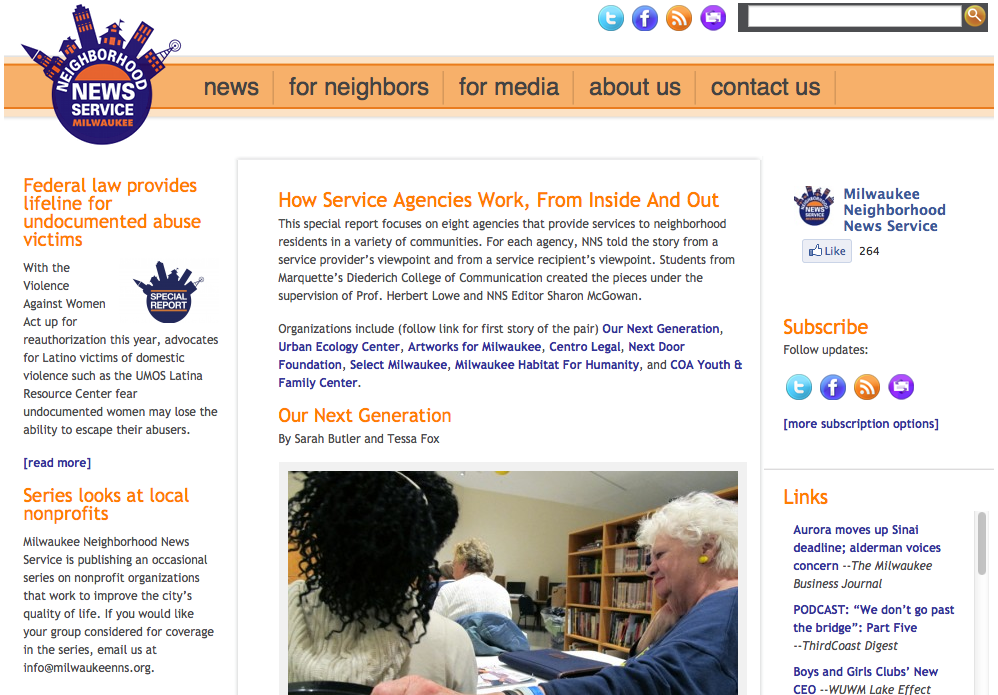McGowan met with JOUR 1550 last week to help me introduce the news service and to reveal this semester's community journalism assignments; they will be from among the 15 finalists for the 2012 MANDI (Milwaukee Awards for Neighborhood Development Innovation). "Anyone of these makes a good story, I think," she told the class.
The editor and I then shared what we learned from our first experience working together. First and foremost, she said, more than a few students last semester seemed unprepared to craft and report a 400-word story. Next, too many factual errors – or, as McGowan put it, "stupid mistakes" related to names, dates, etc. "I really need much more attention to accuracy than I had from the last class," she said. "The factual errors just eat away at our (NNS) credibility. ... Here's how I want you to feel if that happens: I want you to feel sick."
We're just getting started. "Students did not go into the interview sufficiently prepared," McGowan said, noting that agency leaders shared afterward that some had not spent enough time becoming familiar with their assignments. Source information was another problem. With any story, at any level of journalism, editors will likely have questions requiring reporters to reach back to those interviewed for more answers. For the JOUR 1550 assignments, however, many students did not get any contact information for the residents they spoke with. Not even a cell phone number, which seemed to particularly perplex McGowan. "We haven't come across anyone – in any neighborhood or income level – who doesn't have a cell phone or have access to one," she said. "We have to know how to reach them."
Other concerns included knowing when to ask your editor for help and trusting when he or she says to cut bait. Case in point: one pair of students found an organization's leaders inaccessible for way too long. When McGowan proposed another group to feature, the pair dallied and ended up stressing during finals week to complete their work. (Oh yes, being published by NNS represented a significant part of each student's final grade.)
For sure, these matters left me feeling charged, indicted and convicted as an instructor. Last semester was the first time I sent students into the community for assignments. In my three prior terms, I had only had assigned them to cover events on Marquette's campus, and in most cases I attended as well, so spotting factual errors was easy and sourcing wasn't a major problem, either. Of course, community work is much more instructional, it inspires students much more to do their best work and getting published by a professional news service provides invaluable exposure. On the other hand, because neither McGowan nor I live in Wisconsin, fact-checking and sourcing is crucial.
All this to say the instructor and editor are better prepared to help JOUR 1550 and news service succeed. Most importantly, the students will begin their community work much earlier in the course. Instead of distinct multimedia packages on both a service provider and service recipient, they will produce just one package about their agency. Each package will offer multiple sources and longer text stories – 650 words long instead of 400. Also, they will submit drafts of their text stories long before the final deadline, so there's more time for editing and fact-checking.
To be very clear, JOUR 1550 produced some exceptional work last semester for the news service, which is proudly promoting it as a series on its website. (Indeed, McGowan hired two of the students – Tessa Fox and Heather Ronaldson – as interns for this term.) Every news agency spends time learning how to make its product and journalists better, and what me and McGowan learned last term will surely better prepare my students for internships and their first jobs. If nothing else, there's satisfaction in having their work viewed by more than just their instructor.
Here's what Kenya Evans, a part-time beat reporter for the news service, told the class last week after McGowan discussed how the local Fox News affiliate re-published one of her stories: "It feels good to know the stories are getting out there and that people are reading them." Based on these tweets below, my class is ready to get started:
Met @SharonMcGowan_ of the @milwaukeenns today in #jour1550, cannot express how exciting it is to hear about NNS, what a great org!
— Caroline C. (@CarCam13) February 2, 2012
Thanks to @sharonmcgowan_ of @milwaukeenns for speaking to our #JOUR1550 class! I learned a journalist must always ask the next question.
— Olivia Morrissey (@Olivia_J_M) February 2, 2012
@Sharonmcgowan_ talked to us today about the @milwaukeeNNS in #JOUR1550 I am excited to have this opportunity this semester!
— Shoshauna Schmidt (@Shoshauna3) February 2, 2012

 RSS Feed
RSS Feed
